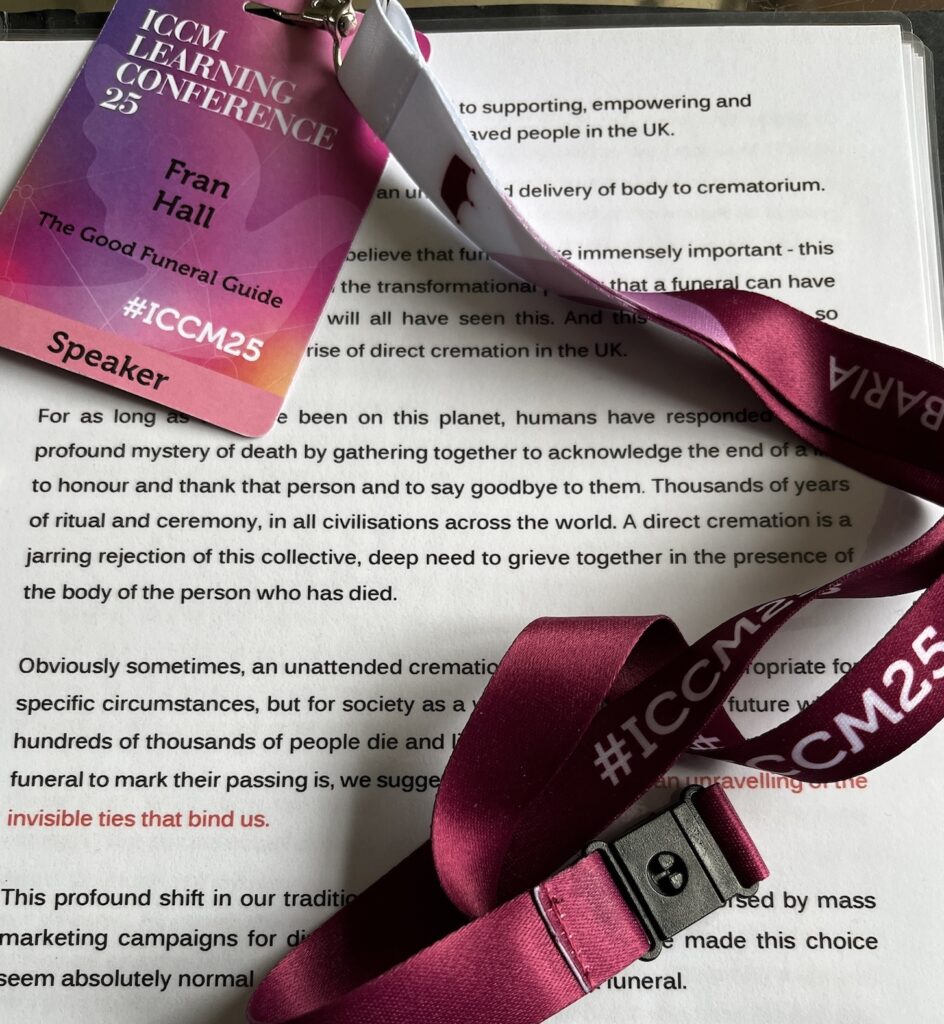Talking about direct cremation

Yesterday, we had the great honour of being invited to take part in the closing debate at the ICCM Learning Conference in Warwickshire. The title of the discussion was ‘Affordable Choice, But at What Cost?’ and the subject was the rise of direct cremation. Our task was to talk about the concerns we have at […]
Saying ‘Adios’: The Hidden Benefit of Direct Cremations in Spain
Guest post by Glynis German “I was interested to see a questionnaire prepared by The Good Funeral Guide (GFG) which I found on the End of Life Doula UK’s Facebook page a little while ago. GFG were gathering information on the topic of Direct Cremations, this low cost approach to funerals, growing in popularity in the UK. As there is very little research in this area, […]
Funerals – how to spend less
We know how expensive funerals can be and that for some people this is the most worrying aspect of planning a funeral. Talking about money when someone has died can feel difficult too, as though we’re being disrespectful to them or to their memory. It’s why we advocate taking your time to find the right […]
Direct cremation – tell us your thoughts
The number of people in the UK choosing direct cremation has risen significantly in recent years, with some indicators suggesting as many as one in five are opting for an unattended cremation. We have had a lot of conversations with others in the funeral sector over the last few months, and as Dying Matter Awareness […]
Urgent action called for amid death certification reform chaos
From time to time we are pleased to publish statements or press releases from our supporters, and today we share the press release below from one of our GFG Recommended funeral directors, addressing an urgent and extremely important matter that is affecting bereaved families across the UK. We hope that the Ministry of Justice pays […]
Cost of Dying 2025 Report – Five things to know
Guest post by Poppy’s Funerals Every year, financial services company Sun Life publishes their research report into funerals: The Cost of Dying. The 2025 report, which came out this week, doesn’t just look at costs but also at wider funeral trends. Having this data publicly available is good news for transparency. It helps start important conversations about […]
Assisted Dying in England and Wales – one step closer.
A profound and radical shift took place last week, and at the Good Funeral Guide, we feel it is essential to acknowledge it. On Friday 29th November, the Private Members Bill sponsored by Kim Leadbeater MP, The Terminally Ill Adults (End of Life) Bill, passed its second reading in the House of Commons with 330 votes in […]
Making it personal
Here at the Good Funeral Guide ,we’re very proud of our unique accreditation programme. We look at each funeral business entirely from a consumer point of view. It’s thorough, it’s thoughtful and explores every aspect of what goes into, or what should go into, creating and running a funeral for the person who’s died, and the people […]
Saving your family all the stress?
We have long held a wary opinion of pre-paid funeral plans here at the GFG. Over the years, we have published numerous blog posts warning people to be extremely careful and to do as much research as possible before committing to purchasing a funeral plan. It’s an absolutely huge market. A multi-billion-pound market. According to Mintel, pre-arranged funerals account […]
But what about the ashes?
Recent disturbing incidents in the news continue to cause bereaved families across the UK worry and concern about whether they have been given the correct cremated remains of the person who has died. We thought it would be helpful to have some clear information in the public domain about exactly what you should expect when […]

